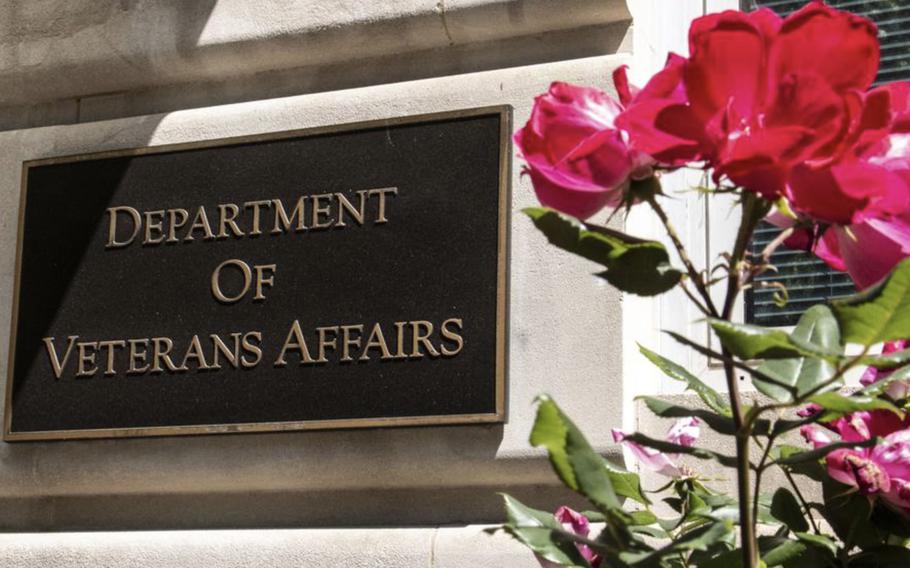
Legislation requiring the Department of Veterans Affairs to accept crisis centers reports, personal statements and other evidence to support disability claims for military sexual trauma when an official report is missing from service records has stalled in Congress over a projected $392 million cost to deliver the benefits through 2032, according to lawmakers. (Stars and Stripes)
WASHINGTON — Legislation requiring the Department of Veterans Affairs to accept crisis center reports, personal statements and other evidence to support disability claims for military sexual trauma when an official report is missing from records has stalled in Congress over a projected $392 million cost to deliver the benefits through 2032, according to lawmakers.
At issue is the Servicemember and Veterans’ Empowerment and Support Act for expanding access to VA benefits and services related to military sexual trauma in cases where the service member did not go through the military chain of command to report a sexual assault or when the incident report is missing from military records.
Sen. Jon Tester, D-Mont., chairman of the Senate Committee on Veterans’ Affairs, has introduced the bill in four sessions of Congress — 2017, 2019, 2021 and 2023.
Tester said he plans to submit a portion of the bill as an amendment to the National Defense Authorization Act, an annual bill specifying expenditures for the Pentagon. The amendment will call for expanding disability and health care compensation for military sexual trauma to all former National Guard members and reservists.
Bills can only be introduced once per congressional session, which is why the legislation has been submitted every two years. The earliest that it can be re-introduced is 2025.
“I won’t stop pushing until we ease this process for survivors. These veterans have simply endured the unimaginable, and we’ve got to deliver them the tools they need to address their trauma,” Tester said.
The Congressional Budget Office estimates the proposed law change would drive up the VA’s costs by $392 million through 2032 to deliver disability compensation and health care for veterans filing or resubmitting claims related to military sexual trauma in cases where there is no incident report in military records.
“My medical examiner at the VA said I had a ‘perceived’ sexual attack. Do you know what a statement like that means to a woman? It happened. There were people there,” said Diane Altiery, who said she was sexually assaulted during her military service in the Navy from 1990-1992.
Altiery, a former petty officer third class, said she reported the sexual assault in 1991 after the incident took place in her barracks at Cherry Point Marine Corps Air Station, N.C.
But she said there was no follow-up by the military chain of command to her complaint about the incident.
“There was not an intervention or anything like that,” Altiery said.
Her VA records show she was awarded disability compensation in 2023, 27 years after first filing a claim that was determined to be incomplete for lack of evidence. Her medical records include doctor’s notes and consultations about the sexual assault.
But Altiery said her claim only received a second review after she hired an attorney who requested her medical military and VA records.
“It has been 20-some years of a lot of frustration. It should not be this difficult to receive services from the VA,” Altiery said, adding she continues to experience mental health problems related to the assault.
“Shouldn’t we be doing more to prevent this conduct in the first place? A lot of work needs to be done on changing the rules and regulation. But what we’re also talking about is a cultural change,” Sen. Angus King, I-Maine, said during a Senate VA committee hearing in April on military sexual trauma.
Veterans are now eligible for disability compensation for conditions related to military sexual trauma, including post-traumatic stress disorder, anxiety, depression, and other mental health conditions that resulted from or became worse after sexual assault or sexual harassment in the military.
Veterans already can submit alternative evidence — including personal statements from family members and reports from rape crisis centers — to support claims for PTSD, but the evidence is not always supported by processors, according to veterans service organizations.
“Military sexual trauma is pervasive,” Julie Howell, associate legislative director of the Paralyzed Veterans of America, said last month at the Senate hearing on military sexual trauma.
She said a 2021 survey of membership found nearly 40% of respondents had experienced sexual assault or abuse while serving in the military, though most did not report it at the time.
Though the victims might experience PTSD and other mental health conditions, Howell said they often do not disclose the abuse, seek counseling or file claims for compensation until several years after leaving the military.
“When so many sexual assaults go unreported in the military, it is my belief that we need to require the VA to consider non-[Defense Department] evidence when reviewing claims for all MST-related mental health conditions,” Tester said at the hearing.
An estimated 128,000 veterans in fiscal 2023 received VA disability compensation benefits related to military sexual trauma, which roughly doubled since 2019, according to the VA.
More than 60% of military sexual trauma-related claims filed last year were approved by the VA, compared to 40% a decade ago, the VA said.
In 2023, the NDAA approved $94 million to expand legal counsel for sexual assault victims in the military and $60 million to fund the sexual assault prevention and response office, which operates outside the military chain of command.
Prosecution of sexual assault and other serious crimes also moved from an accused service members chain of command to the newly established Offices of Special Trial Counsel, which reports directly to the secretaries of the military service branches.